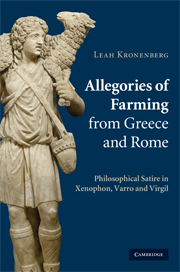Book contents
5 - The politics of farming
from PART II - VARRO'S DE RE RUSTICA
Published online by Cambridge University Press: 03 May 2010
Summary
In a letter from 46 bc (Fam. 9.2.5), Cicero encourages Varro to join him in writing and reading πολιτείας and to devote himself to the republic in his scholarship. While we do not know Varro's exact response to that letter, we do know that he did not write a De Re Publica. The De Re Rustica, however, might be conceived as a polemical answer to Cicero's suggestion, just as Xenophon's Oeconomicus has been conceived as a response to Plato's Republic. In this chapter, I hope to show that the De Re Rustica uses agricultural and pastoral metaphors not to support the Republic but instead to model the deficiencies of political life. According to these political analogies, politics is about maximizing the profit of those in charge and treats people like animals – lessons familiar now from my discussions of Xenophon's Oeconomicus and Plato's Republic. Indeed, throughout the De Re Rustica, but particularly in book 3, Varro engages with Plato's Republic, Xenophon's Oeconomicus, and Cicero's De Re Publica, and his work may be read not just as a satire of political life, but as a parody of political philosophy. However, in Varro's discourse on the res publica, there is no “ideal” state; instead, he undercuts the central thesis of Cicero's De Re Publica, that virtus is fully realized in political life (e.g. Rep. 1.2, 3.6), and instead defends his own choice of a life of otium.
- Type
- Chapter
- Information
- Allegories of Farming from Greece and RomePhilosophical Satire in Xenophon, Varro, and Virgil, pp. 108 - 130Publisher: Cambridge University PressPrint publication year: 2009

